So far, the UK Prime Minister David Cameroon has refused to condemn the violence in Democratic Republic of Congo (DRC) because he supports the dictator and war criminal Paul Kagame who is fighting in DRC, displacing and killing civilians using British tax payer's money.
Why the world is ignoring Congo war
http://www.cnn.com/2012/11/27/opinion/congo-war-ignored-vava-tampa
By Vava Tampa, Special to CNN
updated 10:29 AM EST, Tue November 27, 2012
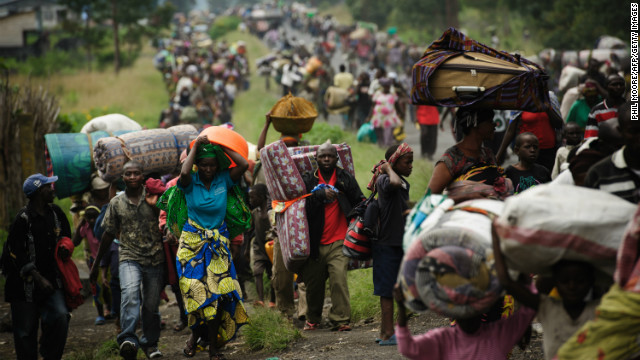 The M23 rebel group is fighting the Democratic Republic of Congo military for control of the country, and the violence is driving tens of thousands of Congolese out of their homes. Here on November 22, thousands fled the town of Sake and headed east to the camps for displaced in the village of Mugunga.
The M23 rebel group is fighting the Democratic Republic of Congo military for control of the country, and the violence is driving tens of thousands of Congolese out of their homes. Here on November 22, thousands fled the town of Sake and headed east to the camps for displaced in the village of Mugunga. 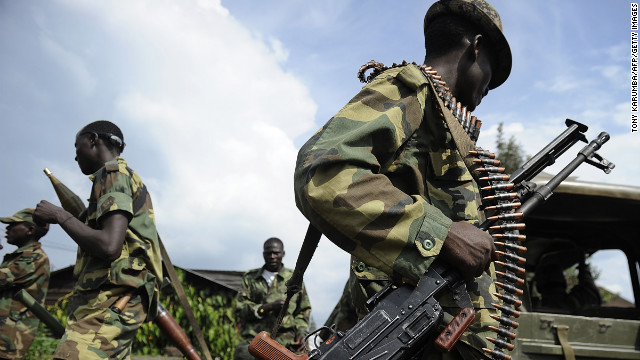 On November 26, M23 commanders refused to leave the city of Goma ahead of a midnight deadline imposed by regional leaders and the African Union. Pictured, rebel soldiers stand guard at the former Congolese army headquarters in Goma, on November 23, 2012.
On November 26, M23 commanders refused to leave the city of Goma ahead of a midnight deadline imposed by regional leaders and the African Union. Pictured, rebel soldiers stand guard at the former Congolese army headquarters in Goma, on November 23, 2012. 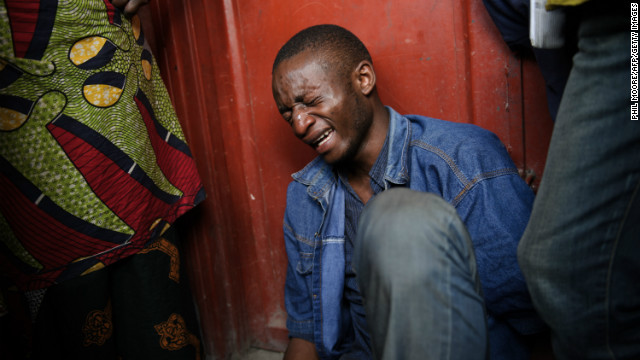 Lokuli Loleko Prince finds the body of his father in Goma on November 21, 2012. Lokuli's father, a government military doctor, was killed in fighting between the government army and M23 rebels as they took the provincial capital.
Lokuli Loleko Prince finds the body of his father in Goma on November 21, 2012. Lokuli's father, a government military doctor, was killed in fighting between the government army and M23 rebels as they took the provincial capital. 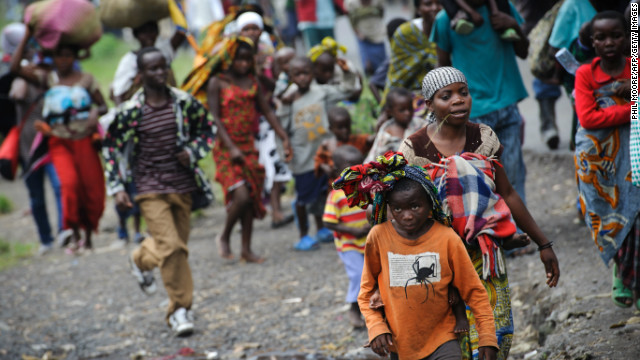 Thousands of Congolese flee the town of Sake, 26km west of Goma, on November 22, 2012.
Thousands of Congolese flee the town of Sake, 26km west of Goma, on November 22, 2012. 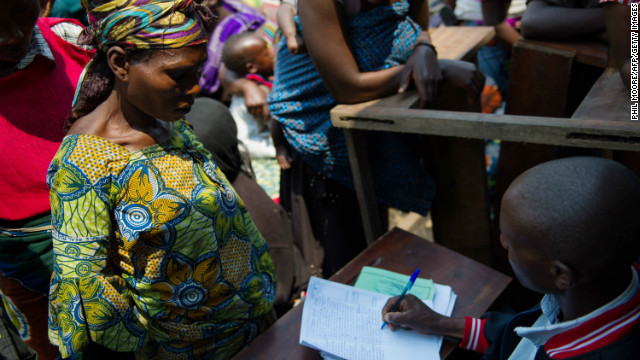 A displaced Congolese woman registers at a camp for displaced persons at Mugunga, 8km from the centre of Goma on November 22, 2012.
A displaced Congolese woman registers at a camp for displaced persons at Mugunga, 8km from the centre of Goma on November 22, 2012. 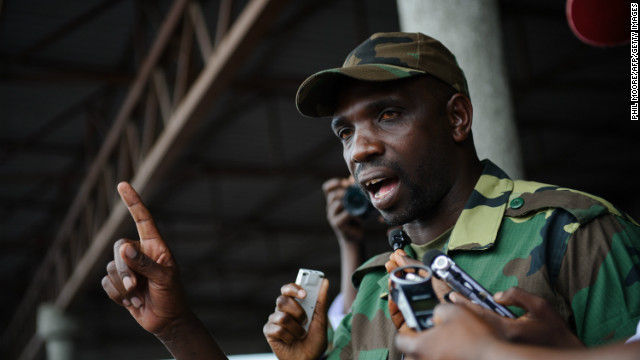 Spokesman of the M23 rebel group Lieutenant-Colonel Vianney Kazarama addresses a crowd at the Volcanoes Stadium in Goma on November 21, 2012.
Spokesman of the M23 rebel group Lieutenant-Colonel Vianney Kazarama addresses a crowd at the Volcanoes Stadium in Goma on November 21, 2012. 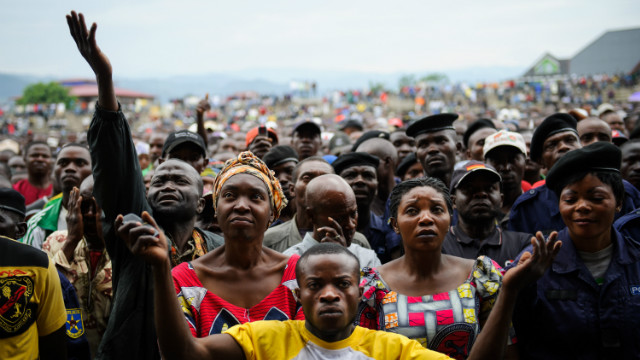 Residents of Goma listen to M23 rebel group spokesman at the Volcanoes Stadium in Goma on November 21, 2012.
Residents of Goma listen to M23 rebel group spokesman at the Volcanoes Stadium in Goma on November 21, 2012. 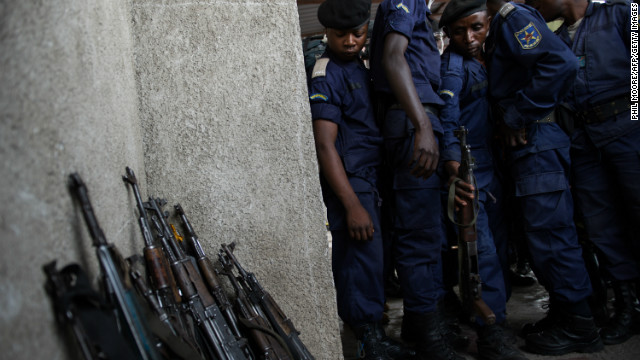 Surrendered police officers hand-in their weapons at the Volcanoes Stadium in Goma, in the east of the Democratic Republic of the Congo, on November 21, 2012.
Surrendered police officers hand-in their weapons at the Volcanoes Stadium in Goma, in the east of the Democratic Republic of the Congo, on November 21, 2012. 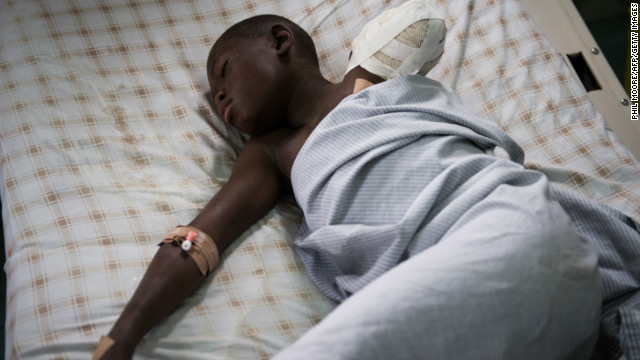 Twelve year old amputee Kakule Elie, hit by a stray bullet, lies in a bed in a hospital in Goma on November 20, 2012.
Twelve year old amputee Kakule Elie, hit by a stray bullet, lies in a bed in a hospital in Goma on November 20, 2012. 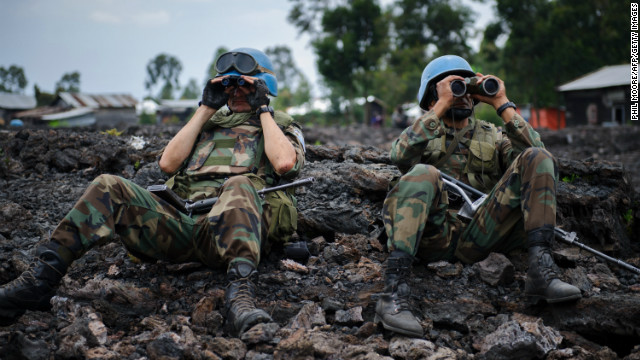 Uruguayan United Nations peacekeepers look through binoculars at M23 rebel positions on the outskirts of Goma.
Uruguayan United Nations peacekeepers look through binoculars at M23 rebel positions on the outskirts of Goma. 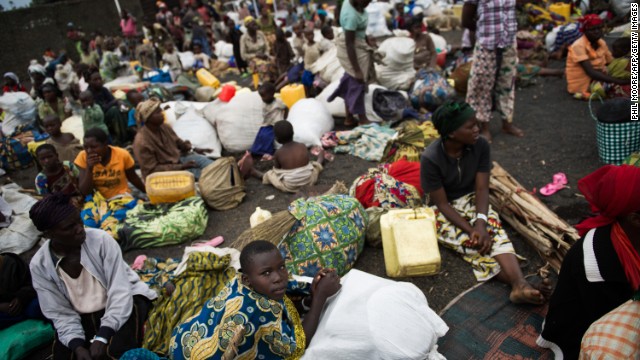 Displaced Congolese sit inside a United Nations base in Monigi, 5km from Goma, as they seek shelter after being forced to flee a temporary camp, on November 18, 2012.
Displaced Congolese sit inside a United Nations base in Monigi, 5km from Goma, as they seek shelter after being forced to flee a temporary camp, on November 18, 2012. 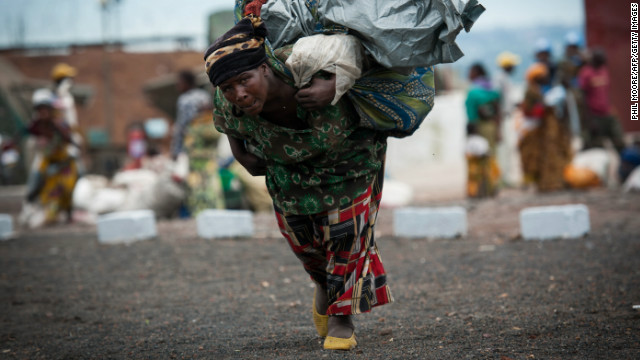 A displaced Congolese woman carries her belongings as she enters a United Nations base in Monigi, 5km from Goma on November 18, 2012.
A displaced Congolese woman carries her belongings as she enters a United Nations base in Monigi, 5km from Goma on November 18, 2012. Editor's note: Vava Tampa, a native of Congo, is the founder of Save the Congo, a London-based campaign to tackle "the impunity, insecurity, institutional failure and the international trade of minerals funding the wars in Democratic Republic of the Congo." Follow Vava Tampa on twitter: @VavaTampa (CNN) -- If humanitarian crises were listed by some sort of moral -- or editorial -- standards on the stock exchange, to help indicate which ones urgently require international news coverage and political action, shares of the situation in the Democratic Republic of the Congo (DRC) would have commanded international news headlines and extensive press coverage over the past 12 years.
The
U.N. has labeled the DRC, Africa's second largest country, as the "
rape capital of the world" because of the pace and scope of the use of rape as a weapon of war by proxy militia gangs fighting for control of Congo's easily appropriable and highly valuable natural resources, destined for sale in Europe, Asia, Canada and the United States.
The wars in that country have claimed nearly the same number of lives as having a 9/11 every single day for 360 days, the genocide that struck Rwanda in 1994, the ethnic cleansing that overwhelmed Bosnia in the mid-1990s, the genocide that took place in Darfur, the number of people killed in the great tsunami that struck Asia in 2004, and the number of people who died in Hiroshima and Nagasaki -- all combined and then doubled.

Vava Tampa, founder of Save the Congo.
Yet we rarely hear anything about it. Indeed, one only need contrast media coverage of the latest
Israeli airstrikes on the Gaza strip and
Hamas rocket attacks into southern Israel, which have made front pages around the world, to the stunningly limited media coverage afforded to graphic accounts of atrocities committed that same week by
M23, the newest militia gang terrorizing the local population.
The same trend has been observed in the extensive coverage of the on-going, fast-moving and difficult-to-report
civil war in Syria, which has claimed
nearly 40,000 lives.
M23's murderous campaigns to besiege Congo's eastern mineral-rich provinces of North and South Kivu have left over 200,000 people in terrible conditions, killed countless and ushered in a dire humanitarian transgression.
The Rwandan government has been accused by the United Nations of backing M23 by providing it with arms, support and soldiers, but Rwanda's President, Paul Kagame, has denied the allegation.
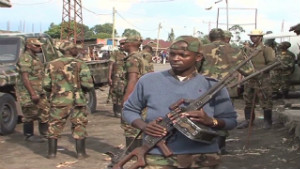 Rebels advancing in Congo
Rebels advancing in Congo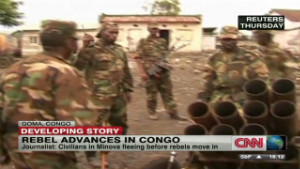 Refugees flee from rebels in Congo
Refugees flee from rebels in Congo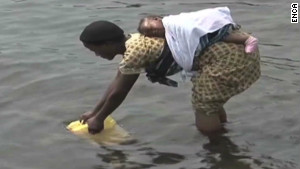 Life in Goma amid crisis
Life in Goma amid crisis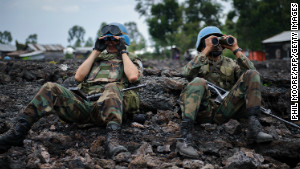 Congolese rebels take over Goma
Congolese rebels take over GomaThe question here is not whether the human suffering in Congo deserves more media coverage because it is greater than that in Syria or Gaza, but rather, why has the crisis in Syria or Gaza qualified for extensive media coverage, but not the killing and raping industries in Congo?
I doubt that this is because of a shortage of sobering imagery of Congo's killing fields or a lack of first-hand testimonies from survivors, or a lack of human rights and humanitarian reports and assessments of the situation.
Is it due to the geographical or cultural distance between London or Washington and Congo? Or are Western media just reluctant, if not uninterested, to cover it because no Western interests or ally is endangered by it?
Would the coverage the situation in Congo receives be the same if it was happening in Europe or if Congo spoke English rather than French?
What if Robert Mugabe of Zimbabwe or his disciples were implicated in funding murderous militia gangs in Congo? Or if the killing was between black Africans and Arabs? Or if
minerals funding Congo's killing and raping industries benefited the East more than the West?
But as an activist, I believe that the editors of news organizations such as CNN, Al Jazeera and the BBC must flood the airwaves with vivid images and news stories on the human sufferings in Congo. Newspapers such the Guardian, in the UK, and the New York Times must drumbeat front-page news stories on the wars and human tragedy engulfing that country.
Unless they tip that balance a little and force policy makers in Washington and internationally to pay more attention and act, the killing, raping and looting that have thus far claimed over 5.4 million Congolese lives, and continue to leave
1,100 women raped every single day, could continue to unfold undetected by the camera lenses of Western media and excluded from Western political agenda
The Hard Truths We Must Swallow: The Rwandan Government Wreaking Havoc in Congo
The Rwandan Genocide was 19 years ago. Though the genocide ended in 1994, its consequences are still deeply felt today. For myself and other survivors, those memories are ever-present. We have never forgotten the horrors we lived through, as unimaginable violence overtook our country. We grapple with mixed emotions, trying to process, and come to terms with today's reality. Our struggle has evolved from physical survival, to that of emotional turmoil caused by our trauma. Some days, we are grateful to be alive, to breathe, and to feel. Other days are fraught with anger, guilt, and sadness. We wrestle with endless, unanswerable questions. Many days we feel unworthy to be alive. We cannot comprehend why we are still alive and why many others perished. Why me, we wonder? Why not my family or friends? We wonder why we had to witness their demise and are angry because we felt so helpless. Try as we might, we can never reverse the darkest moments of our lives. We cannot undo the damage, no matter how hard we wish we could. The genocide was real, it happened, and we live with its consequences to this very day. I was a powerless child, but still, what if there was something I could have done? And what if it happened again?
It is precisely this fear of another genocide carried out by the same perpetrators that carried out the genocide of 1994 that motivated the current Rwandan government's first invasion of Congo in 1996. It is this fear that has sustained the Rwandan government's justification for repeated intervention in the Congo over the last 16 years. And it is precisely why the world continues to live with the consequences of the Rwandan Genocide. Even though as survivors of the Rwandan Genocide we understood the security the Rwandan government sought when they first invaded Congo, we did not sanction the human catastrophe they triggered. We did not sanction the torture, rape, and possible genocide of women, children, and the elderly that were targeted in Congo when the Rwandan Government sent troops inside of Congo for "our protection." And we certainly did not sanction the government of Rwanda's "Six-Day War" against Uganda over a diamond mine inside Congo, leaving significant numbers of Congolese people dead, injured, and displaced. And even now, we do not sanction the violation of the United Nations arms embargo, undermining of peace deals and processes, and commanding proxy rebel groups who kill, torture, rape, and displace people, while illegally capturing cities in Congo. And most of all, we do not sanction any attempt to annex any part of Congo in our name.
Since the first invasion,
more than 5 million people have died in Congo, making it the deadliest conflict since the Second World War. And many of those deaths lie at the hands of the Rwandan government. These are hard truths we must swallow. Not only must we come to terms with crimes that were committed against us, we must now deal with crimes committed in our names. These crimes are not simply committed in our names, survivors of the Rwandan Genocide, but in the name of the entire global community that stands still, providing tacit approval. They are also committed for the same international community that justifies, excuses, and protects, the Rwandan government, as it continues to wreak havoc in the Congo. Though we could not stop or stand up against the violent acts that were committed against us during the Rwandan genocide, we can and we must stop and stand up against crimes committed against others, crimes committed in our name in Congo.
After 16 years of invasion and intervention through proxy groups, it is still difficult for people in the international community to accept that the Rwandan government is guilty of anything but justified intervention in Congo. But members of the international community must look past the glowing economic reviews, look past the constant denials, and well-oiled public relations machine, and deal with the hard truths. The Rwandan government is committing unspeakable crimes against humanity in the Congo under false pretenses, and we must stop it. U.S. President Barack Obama understood this when as Senator,
he authored and passed into law the Democratic Republic of Congo Relief, Security and Democracy Promotion Act, PL 109-456 in 2006 that called for accountability for Congo's neighbors who destabilize the country. And he understood it last summer when he cut $200,000 in military aid to Rwanda. And he understood it last December when he personally made a call to Rwandan President Paul Kagame and asked him to cease support of the M23 rebel group, currently wreaking havoc in Congo.
Despite all these steps from the Obama administration to address the conflict, the
Rwandan government continues to relentlessly support, arm, and command rebel groups such as the M23, while these groups continues to commit war crimes and human rights violations in Congo. It is precisely because we refuse to swallow these hard truths that the Rwandan government continues to commit such atrocities unchallenged and with impunity. If we can muster the courage to face these truths, we can impose accountability measures consistent with the degree of suffering and instability wrought by the Rwandan government against the Congolese people. We can and we should sanction and impose travel bans and freeze assets of identified Rwandan military personnel responsible for committing atrocities in Congo. And we should cut or withhold military aid to a dangerous regime that wages and sponsors war and conflict in the territory of another nation.
Survivors of the Rwandan Genocide mourned and commemorate the 19th anniversary of the genocide this past spring. As we commemorate our loved ones, we continue to grapple with traumas of our past, and issues of our present. Our responsibility lies in what we do with our future, and how we stand up to evil perpetrated against our neighbors. We, along with the rest of the world, must no longer refuse to swallow difficult and painful truths, and dedicate consistent focus and action towards resolving the deadliest conflict since the Second World War in Congo.
M23 rebels attack Congo troops near Goma
http://www.theguardian.com/world/2013/aug/27/m23-rebels-congo-troops-goma
Both sides reportedly suffer heavy casualties and three UN peacekeepers are wounded near Rwandan border

 Rebels advancing in Congo
Rebels advancing in Congo Refugees flee from rebels in Congo
Refugees flee from rebels in Congo Life in Goma amid crisis
Life in Goma amid crisis Congolese rebels take over Goma
Congolese rebels take over Goma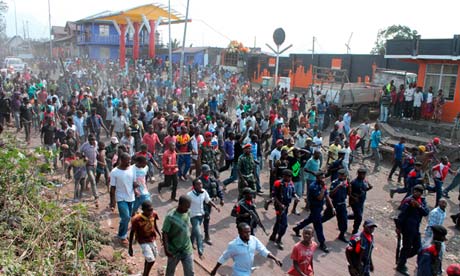
 The M23 rebel group is fighting the Democratic Republic of Congo military for control of the country, and the violence is driving tens of thousands of Congolese out of their homes. Here on November 22, thousands fled the town of Sake and headed east to the camps for displaced in the village of Mugunga.
The M23 rebel group is fighting the Democratic Republic of Congo military for control of the country, and the violence is driving tens of thousands of Congolese out of their homes. Here on November 22, thousands fled the town of Sake and headed east to the camps for displaced in the village of Mugunga.  On November 26, M23 commanders refused to leave the city of Goma ahead of a midnight deadline imposed by regional leaders and the African Union. Pictured, rebel soldiers stand guard at the former Congolese army headquarters in Goma, on November 23, 2012.
On November 26, M23 commanders refused to leave the city of Goma ahead of a midnight deadline imposed by regional leaders and the African Union. Pictured, rebel soldiers stand guard at the former Congolese army headquarters in Goma, on November 23, 2012.  Lokuli Loleko Prince finds the body of his father in Goma on November 21, 2012. Lokuli's father, a government military doctor, was killed in fighting between the government army and M23 rebels as they took the provincial capital.
Lokuli Loleko Prince finds the body of his father in Goma on November 21, 2012. Lokuli's father, a government military doctor, was killed in fighting between the government army and M23 rebels as they took the provincial capital.  Thousands of Congolese flee the town of Sake, 26km west of Goma, on November 22, 2012.
Thousands of Congolese flee the town of Sake, 26km west of Goma, on November 22, 2012.  A displaced Congolese woman registers at a camp for displaced persons at Mugunga, 8km from the centre of Goma on November 22, 2012.
A displaced Congolese woman registers at a camp for displaced persons at Mugunga, 8km from the centre of Goma on November 22, 2012.  Spokesman of the M23 rebel group Lieutenant-Colonel Vianney Kazarama addresses a crowd at the Volcanoes Stadium in Goma on November 21, 2012.
Spokesman of the M23 rebel group Lieutenant-Colonel Vianney Kazarama addresses a crowd at the Volcanoes Stadium in Goma on November 21, 2012.  Residents of Goma listen to M23 rebel group spokesman at the Volcanoes Stadium in Goma on November 21, 2012.
Residents of Goma listen to M23 rebel group spokesman at the Volcanoes Stadium in Goma on November 21, 2012.  Surrendered police officers hand-in their weapons at the Volcanoes Stadium in Goma, in the east of the Democratic Republic of the Congo, on November 21, 2012.
Surrendered police officers hand-in their weapons at the Volcanoes Stadium in Goma, in the east of the Democratic Republic of the Congo, on November 21, 2012.  Twelve year old amputee Kakule Elie, hit by a stray bullet, lies in a bed in a hospital in Goma on November 20, 2012.
Twelve year old amputee Kakule Elie, hit by a stray bullet, lies in a bed in a hospital in Goma on November 20, 2012.  Uruguayan United Nations peacekeepers look through binoculars at M23 rebel positions on the outskirts of Goma.
Uruguayan United Nations peacekeepers look through binoculars at M23 rebel positions on the outskirts of Goma.  Displaced Congolese sit inside a United Nations base in Monigi, 5km from Goma, as they seek shelter after being forced to flee a temporary camp, on November 18, 2012.
Displaced Congolese sit inside a United Nations base in Monigi, 5km from Goma, as they seek shelter after being forced to flee a temporary camp, on November 18, 2012.  A displaced Congolese woman carries her belongings as she enters a United Nations base in Monigi, 5km from Goma on November 18, 2012.
A displaced Congolese woman carries her belongings as she enters a United Nations base in Monigi, 5km from Goma on November 18, 2012.
No comments:
Post a Comment